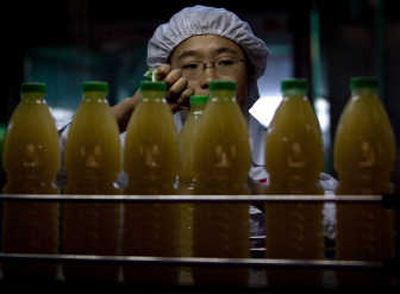U.S., China sign product safety deal

BEIJING – China and the United States signed agreements Tuesday to increase safeguards over Chinese products and to open up midsize Chinese cities to American imports, a move aimed at assuaging critics of Beijing’s massive trade surplus.
The agreements came on the first day of a series of trade talks that Washington hopes will yield real progress on increasing U.S. exports to China. Washington’s trade deficit with China will likely surpass last year’s record $233 billion, according to U.S. Commerce Department figures, amplifying calls in Congress for punishing legislation over what some call unfair Chinese trade practices.
Coinciding with talks, China announced that its global trade surplus totaled $26.28 billion in November, showing demand for low-cost Chinese goods has not waned despite recalls and warnings over faulty or tainted products, ranging from toothpaste to tires.
During the first 11 months of the year, China’s global trade surplus totaled $238.9 billion, 53 percent greater than the same period a year ago, the Chinese government said.
Trade officials from both sides warned of protectionism, with the new trade figures likely to complicate talks. U.S. Commerce Secretary Carlos Gutierrez said the answer was to boost U.S. exports rather than limit imports from China.
U.S. Treasury Secretary Henry Paulson and Chinese Vice Premier Wu Yi attended a ceremony marking the opening of the New York Stock Exchange’s representative office in Beijing – a bid to attract more listings from China’s rapidly expanding economy.
In later remarks, Gutierrez praised a long-awaited tourism accord that allows Chinese groups to travel to the United States, saying that would “open a large and growing market for the U.S. travel and tourism industry.”
Other agreements include the development and production of biofuels, opening China’s second-tier cities to U.S. exports, and expanding U.S. access to Chinese markets for goods and services, from agriculture to telecommunications.
China’s exports have come under intense scrutiny this year after a number of potentially deadly chemicals have been found in goods including toothpaste, toys and seafood.
In March, tainted pet food made in China was blamed for the deaths of cats and dogs in North America. Last month, regulators found the coating on beads in a popular toy sold globally, and manufactured in China, metabolized into the “date-rape” drug gamma hydroxy butyrate when ingested.
U.S. Health Secretary Mike Leavitt said two agreements on food and animal feed, drugs and medical devices would “enhance the safety of scores of household items the American people consume on a daily basis.”
A Health Department statement said the agreements will increase information exchanges and require registration for exporters.
“To keep up with the pace of global commerce, we need a fundamental shift from trying to catch unsafe products as they come in, to building quality and safety into products before they reach our borders,” Leavitt said.
Wu, the vice premier, said Tuesday that big steps had been taken in the past few months to improve China’s product safety. However, she said there remained gaps between developing and developed countries in standards and supervision.
“This means we need to expand our common ground and jointly strengthen our supervision and control efforts to improve product quality,” she said in a commentary published in the Asian Wall Street Journal on Tuesday.